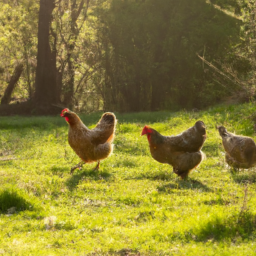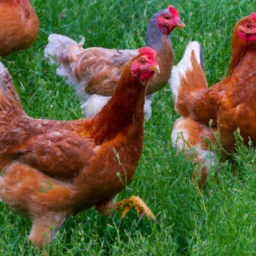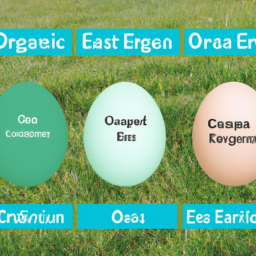When it comes to choosing healthier chicken options, there are several factors to consider.
Pasture-raised, organic, free-range, and cage-free chickens all provide different benefits.
Conventional chicken farming practices in factory farms prioritize quantity over the overall health of the birds, leading to issues such as overcrowding and the use of antibiotics.
On the other hand, pasture-raised chickens have access to fresh air and ample space to roam outdoors, resulting in lower levels of bacteria and higher levels of healthy fats and vitamins.
Understanding the differences between these options can help individuals make informed decisions for their health.
Key Takeaways
- Pasture-raised chicken offers a healthier option with lower levels of bacteria, higher levels of healthy fats and vitamins, and the ability for chickens to forage for natural food sources.
- Organic chicken provides a choice that avoids antibiotics, hormones, and genetically modified feed, meeting USDA standards and ensuring the absence of synthetic additives.
- Free-range chicken allows for more natural movement and potential access to outdoor foraging, although the feed provided is not regulated.
- When choosing healthier chicken options, consider trusted certifications such as Certified Humane, Animal Welfare Approved, and USDA Organic to ensure ethical treatment and higher quality standards.
The Benefits of Pasture-Raised Chicken

Pasture-raised chicken offers lower levels of bacteria, higher levels of healthy fats and vitamins, and the opportunity for chickens to forage for natural food sources. Compared to conventionally farmed chicken breeds, pasture-raised chickens have lower levels of salmonella and E. coli bacteria. They also contain higher levels of healthy fats, omega-3 fatty acids, and vitamins A and E.
Additionally, pasture-raised chicken allows chickens to forage for natural food sources, which contributes to their overall health and well-being. From an environmental standpoint, pasture-raised chicken farming practices have several benefits. They promote sustainable agriculture by utilizing natural resources and minimizing environmental impact.
Pasture-raised chickens have a lower carbon footprint compared to conventionally farmed chickens, as they are raised in open spaces and have access to fresh air and sunlight. Overall, choosing pasture-raised chicken not only provides nutritional advantages but also supports environmentally conscious farming practices.
Understanding Organic Chicken and Its Advantages

Organic chicken is raised without antibiotics, hormones, or genetically modified feed, ensuring a higher standard of quality and ethical treatment. Organic chicken farming practices focus on providing chickens with organic feed, access to fresh air and sunlight, and enough space per bird.
This type of farming eliminates the use of synthetic additives and follows USDA standards for organic production. Choosing organic chicken has environmental benefits, as it avoids the use of harmful chemicals and genetically modified feed. It also supports better treatment of animals, promoting their overall well-being.
While organic chicken tends to be more expensive, it offers consumers the assurance of higher quality standards and the satisfaction of making a more sustainable choice. By opting for organic chicken, individuals can contribute to a healthier food system and reduce their environmental impact.
Exploring the Advantages of Free-Range Chicken

Free-range chicken offers chickens the opportunity to move more freely and potentially find natural food sources outdoors. From an environmental perspective, free-range chicken farming can have a positive impact. Chickens are able to graze on natural vegetation, reducing the need for intensive feed production and minimizing the environmental footprint associated with conventional chicken farming.
In terms of nutritional value, free-range chicken tends to have a higher content of healthy fats, such as omega-3 fatty acids, compared to conventional chicken. Additionally, free-range chicken may contain higher levels of vitamins A and E, which are important for overall health.
Research has shown that free-range chicken may have lower levels of antibiotic-resistant genes compared to conventionally farmed chicken breeds. This is significant as the overuse of antibiotics in conventional chicken farming contributes to antibiotic resistance, a global health concern.
While free-range chicken offers potential benefits, it’s important to note that the specific nutritional content can vary depending on factors such as diet and living conditions. Consumers should look for reputable certifications and rely on evidence-based information to make informed decisions about their chicken choices.
The Importance of Third-Party Certifications for Chicken

Third-party certifications, such as Certified Humane and Animal Welfare Approved, provide assurance of ethical treatment and higher quality standards for chicken. These certifications are important for consumers who prioritize animal welfare and want to make informed choices about the chicken they purchase.
Here are four key points about the impact of third-party certifications on consumer purchasing decisions:
Consumer awareness: Third-party certifications raise consumer awareness about the ethical treatment of chickens and the importance of higher quality standards in the poultry industry. These certifications help consumers make more informed choices when purchasing chicken.
Assurance of ethical treatment: Third-party certifications ensure that the chickens have been raised in humane conditions, with access to fresh air, adequate space, and proper care. This gives consumers peace of mind knowing that the chickens have been treated ethically.
Higher quality standards: Third-party certifications also guarantee higher quality standards for chicken. This includes factors such as the absence of antibiotics and hormones, the use of organic feed, and adherence to strict animal welfare guidelines. Consumers can trust that certified chicken meets these higher quality standards.
Impact on purchasing decisions: The presence of third-party certifications can significantly influence consumer purchasing decisions. Studies have shown that consumers are more likely to choose certified chicken over non-certified options because they value animal welfare and quality standards.
Health Benefits of Choosing Healthier Chicken Options

Consumers can enjoy lower levels of bacteria, higher levels of healthy fats and vitamins, and reduced risk of foodborne illnesses by opting for healthier chicken options.
Pasture-raised chicken, for example, has lower levels of salmonella and E. coli bacteria compared to conventionally farmed chickens. It also contains higher levels of healthy fats, omega-3 fatty acids, and vitamins A and E.
Organic chicken, on the other hand, is raised without antibiotics, hormones, or genetically modified feed, further reducing the risk of antibiotic resistance and potential health concerns.
Free-range chicken allows for more natural movement and potential access to outdoor foraging, contributing to the overall health of the chicken and potentially improving heart health.
Considerations for Choosing the Best Chicken Option

When considering the best chicken option, individuals should assess their priorities, such as animal welfare, environmental impact, and personal health. Here are some key considerations for choosing the best chicken option:
Animal Welfare: Evaluate how the chickens are raised and treated. Pasture-raised and organic chickens generally have better living conditions and access to outdoor space compared to conventionally farmed chickens.
Environmental Impact: Consider the environmental implications of different chicken production methods. Pasture-raised and organic chickens tend to have lower environmental impacts due to their more sustainable farming practices.
Personal Health: Examine the nutritional content of the chicken. Pasture-raised chicken is known to have higher levels of healthy fats, omega-3 fatty acids, and vitamins A and E compared to conventionally farmed chicken.
Cost Implications: Keep in mind that choosing healthier chicken options, such as pasture-raised or organic chicken, may have higher price points compared to conventionally farmed chicken. Consider your budget and weigh it against your personal values when making a decision.
Frequently Asked Questions
What Are the Potential Environmental Impacts of Conventional Chicken Farming?
Conventional chicken farming can have potential environmental impacts. Practices such as overcrowding and low-quality food contribute to issues like fecal waste contamination, groundwater pollution, and air emissions. Antibiotics used in conventional farming can lead to antibiotic resistance.
However, choosing healthier chicken options like pasture-raised, organic, or free-range can help mitigate these impacts. These alternative methods prioritize animal welfare, provide access to natural food sources, and avoid the use of antibiotics and hormones. Trusted certifications can ensure higher quality standards are met.
What Are the Differences Between Pasture-Raised, Organic, Free-Range, and Cage-Free Chickens?
Differences between pasture-raised, organic, free-range, and cage-free chickens can impact animal welfare, environmental sustainability, and nutritional content.
Pasture-raised chickens have access to outdoor space and forage for natural food sources, resulting in lower bacteria levels and higher healthy fats and vitamins.
Organic chickens are raised without antibiotics, hormones, or genetically modified feed, meeting USDA standards.
Free-range chickens have indoor and outdoor living conditions, while cage-free chickens are not kept in battery cages but may still lack outdoor access.
Consumers should consider their priorities and desired outcomes when choosing the best chicken option.
How Do Third-Party Certifications Ensure Higher Quality Standards for Chicken?
Third-party certifications play a crucial role in ensuring higher quality standards for chicken. These certifications provide assurance of ethical treatment and adherence to specific guidelines. They help consumers make informed choices by verifying that the chicken has been raised in a manner that meets certain criteria, such as animal welfare and environmental impact.
Are There Any Specific Health Benefits Associated With Choosing Healthier Chicken Options?
When choosing healthier chicken options, there are specific health benefits to consider.
- Pasture-raised chicken has lower bacteria levels, higher healthy fats, and more vitamins.
- Organic chicken avoids antibiotics, hormones, and genetically modified feed.
- Free-range chicken allows for more natural movement and potential outdoor foraging.
These healthier choices can reduce the risk of foodborne illnesses and contribute to improved heart health.
It’s important to assess priorities, understand the differences between options, look for trusted certifications, and consider cost implications to make an informed decision.
What Factors Should I Consider When Choosing the Best Chicken Option for Me?
When choosing the best chicken option, there are several factors to consider.
First, assess your priorities, such as animal welfare, environmental impact, and personal health.
Next, understand the differences between pasture-raised, organic, free-range, and cage-free chickens. Look for trusted certifications like Certified Humane or USDA Organic to ensure higher quality standards.
Consider the nutritional benefits of each option, such as lower bacteria levels and higher levels of healthy fats and vitamins in pasture-raised chicken.
Lastly, weigh the cost implications and make an informed decision based on your values and desired outcomes.